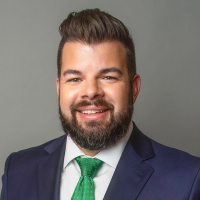SALT LAKE CITY — A major bill unveiled on Utah's Capitol Hill could dramatically change how water is paid for in the state.
The bill was formally presented on Wednesday by Sen. Dan McCay, R-Riverton, who co-chairs the Utah State Legislature's Interim Revenue & Taxation Committee. FOX 13 News first reported on Sen. McCay's proposal in May.
"If we’re going to get serious about the drought behaviors we need to change? One of them for sure is tying rates closely to usage," he said in an interview with FOX 13 News.
The bill would carve out water from property taxes. Right now, most people do pay a monthly water bill. However, the bulk of their water use is covered in property taxes. Sen. McCay is proposing to upend that.
"It shelters some taxpayers because they don’t pay property tax but it also doesn’t really show on your monthly bill what your true cost of water is to you," he said.
Sen. McCay argued that by removing water use from property taxes, people will be forced to pay for what they actually use.
"As people see the potential for their bill to go up, they’re going to start looking at how do I cut back, how do I change?" he said.
What it also means is some big institutions that don't pay property taxes could find themselves having to pay a water bill. Nonprofits, churches and governments don't pay property taxes now. Sen. McCay said he envisioned them paying in the future.
That had support from members of the committee on Wednesday.
"I think what this does is large institutions that are currently tax exempt — schools, churches, nonprofits — it will require them to think more carefully about their water usage," said Rep. Steve Eliason, R-Sandy.
One of those directly impacted would be The Church of Jesus Christ of Latter-day Saints. It is a nonprofit and a major property owner in Utah. The faith also exercises a significant influence politically in Utah. So far, the Church has not weighed in for or against the bill. A spokesman for the faith declined to comment to FOX 13 News on it.
"They haven’t expressed any objections nor have I seen that they have any objections," Sen. McCay told FOX 13 News when asked about their stance on his legislation.
Groups representing local water districts and municipal governments raised concerns about the bill and its impact on both infrastructure improvements and conservation efforts.
"This is not the time to move this bill forward. It is not the proper approach to address the concerns, at least the legitimate concerns I see related to conservation," said Mark Stratford, who spoke on behalf of four of Utah's largest water conservancy districts. "If you just don’t like taxes and you want to kill a property tax and you’re using the drought as an opportunity to do that, that’s one thing. But if we’re talking about conservation, there are far better ways of moving conservation forward than eliminating property tax."
LeGrand Bitter with the Utah Association of Special Districts said the change in tax policy would not grapple with growth and paying for expensive capital projects.
"One hundred percent of the burden for paying for that new infrastructure would rest on those who currently have service," he warned the committee.
But the bill won support from the Utah Rivers Council, an environmental group that has been a frequent critic of the legislature's actions on drought.
"The basic problem the property tax creates is it lowers the price of water and leads to overconsumption," Utah Rivers Council Executive Director Zachary Frankel testified.
The Utah Taxpayers Association also championed the bill, arguing that user fees will prompt conservation.
Faced with a shrinking Great Salt Lake and a drought that does not appear to be ending, many lawmakers united in their support of the bill. Rep. Doug Sagers, R-Tooele, said they were facing an immediate crisis with the Great Salt Lake at a record low.
"We can either save the lake now or we can in two, three years it may be when you have dust coming into your home with toxic chemicals? We can fix it then," he said, arguing that waiting would be too expensive.
Rep. Joel Briscoe, D-Salt Lake City, said he would fully support the bill.
"If you’re putting $500 to $600 worth of water on your lawn in the summer? Then put on your big boy, big girl pants and pay $500 or $600 bucks or use less water," he said.
Sen. McCay opted to hold the bill for a month to negotiate with the local water districts. If the bill secures a favorable committee vote in the interim, it can be "fast-tracked" in the general legislative session that starts in January.





